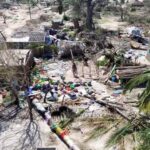The Democratic Republic of Congo (DRC) has launched legal complaints in France and Belgium against Apple’s subsidiaries, accusing the company of profiting from conflict minerals.
Acting on behalf of the DRC government, lawyers argue that Apple is complicit in crimes carried out by armed groups that control mining operations in the country’s mineral-rich eastern region.
In a statement, the lawyers highlighted Apple’s supply chain as being tainted with “blood minerals,” alleging that tin, tantalum, and tungsten extracted from conflict areas are “laundered through international supply chains.” They claim these operations have perpetuated cycles of violence, financed militias and terrorist groups, and contributed to forced child labor and environmental destruction.
The authorities in France and Belgium are now tasked with determining whether sufficient evidence exists to advance the case.
Apple has yet to respond to BBC requests for comment. However, in its 2023 review submitted to the US Securities and Exchange Commission (SEC), Apple emphasized its commitment to ensuring responsible sourcing. The report stated that while Apple does not directly purchase or source raw minerals, the company enforces strict due diligence standards throughout its supply chain.
Apple added that all participants in its supply chain undergo an “independent third-party conflict minerals audit.” It noted that in 2023, 14 smelters and refiners were removed from its supply chain for failing to comply with responsible sourcing standards.
The mineral-rich eastern region of the DRC has been a critical source of materials needed for modern electronics. However, for decades, this wealth has fueled violence, with armed groups exploiting the mining industry to fund operations. Rights organizations have long alleged that minerals from both licensed and illegal mines make their way into neighboring Rwanda, where they are introduced into global supply chains before ending up in products like smartphones and computers.
Rwanda, for its part, has previously dismissed such accusations by the Congolese government as “media stunts” and denied involvement in selling conflict minerals to major companies like Apple.
As investigations unfold, the case highlights the ongoing complexities surrounding the global demand for minerals and the ethical challenges companies face in ensuring clean supply chains.














Leave a comment